
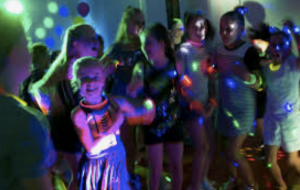 When I was 7, I went to a disco-themed birthday party. The birthday girl was my then best-friend, Helen. The mid-summer party was held in the local village hall.
When I was 7, I went to a disco-themed birthday party. The birthday girl was my then best-friend, Helen. The mid-summer party was held in the local village hall.
Once we’d polished off the strawberries and cake, the long trestle tables were dragged and scraped back against the walls, ready for the dancing to begin.
I wore my very best outfit. A white blouse, with a red corduroy skirt, knee-high socks, red ankle boots and braids. I thought I looked fantastic! 😉 There was a disco ball, a DJ playing loud, thumping music, a fog-spewing smoke machine and a rainbow of bright, flashing lights. I was in heaven!
Part way through the evening, there was a dance-off of sorts which remarkably, I won. It was not so much the winning that mattered to me, although that was exciting! But it was the fact that, for the first time in my 7 year old life, someone actually told me I was good at something.
I tucked that euphoric moment away inside my heart and never told a soul about it, until now. You see, in my family, moments like that would have been trampled on, twisted and turned against me.
Like the time I scored 98% on an end-of-year geography test. My father’s reaction was not one of pride but hostility and rejection. As I showed him my report card, anxiously hoping for some kind words or encouragement, he shrugged and demanded: ‘what happened to the other 2%?’ I was deflated and crumpled in my disbelief. There was no way I was going to let my father in on my dancing-joy and risk him destroying that dream too.
If you experienced trauma and abuse growing up, chances are, this sounds familiar to you. You can probably relate and think of many experiences from your own childhood where you were criticized or shamed and left feeling like you just weren’t good enough. And my guess is that like me, these repeated experiences gradually eroded your confidence and self-esteem.
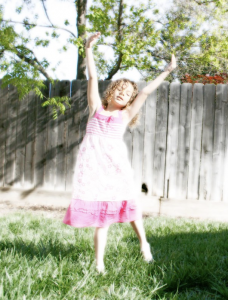
Our childhood experience dictates our adult identity…
When we have a history of emotional, physical, or sexual abuse and trauma, the detrimental effect that it has on our identity and self-esteem is profound. It impacts every area of our lives from our health and well-being to our relationships, our weight, our finances and so much more. The challenge that so many of us still face as adults, is thinking that what happened to us was our fault.
But, the reality is that so many of the things we did to survive, whether it be self-harm, self-hatred or neglect; all the things we thought about ourselves and all the ways we acted-out, were in fact simply coping strategies that we turned to in order to survive.
And we did survive!
When you think back to your childhood, what were you like? What did you love to do? Did you sing? Did you dance? Did you write stories? Were you funny? Were you creative, artistic or brilliant at math? Perhaps you loved to read or play sports. Or to make potions or DIY science experiments. Were you encouraged in these pursuits? Were you playful and care-free? Or was your open spirit and curiosity about the world squashed and belittled?
You see, our early years are so incredibly formative in the development of our identity and belief systems. They carve out who we believe ourselves to be and how we think, feel and speak about ourselves.
If we are supported, nurtured and loved, our beliefs become nourishing and help us succeed in our lives. If however, we are ridiculed and abused, the words we hear tend to become our critical inner voice; the voice that constantly loops in our head, over time, strengthening our negative beliefs, and creating the emotional blocks that hold us back and keep us feeling stuck in our lives.
But we don’t have to stay stuck. When you look back now, was there ever a time (that you can consciously remember) when you felt more care-free and like ‘yourself’? If so, it is these fragments of self that we can begin to re-kindle, reclaim and stitch back together in our healing journey. And if not, then we have an opportunity to begin to create our identity and sense of self anew.
My trauma had a profound impact on my identity!
As a very little girl, (way before my disco-dancing win) I was always singing and dancing around the house. I found an old discarded wooden door in the garage, dragged it to our back yard and used it to pretend I was a tap dancer and the door was my stage!
I would put on shows for my stuffed animals. At age 5, I finally convinced my Mum to let me try ballet. I took a few classes and absolutely loved it. But money was tight and around that same time, my dad got a new job. We moved to a new city in a different part of the country. The lessons stopped and I was heart-broken.
So how did I go from being a playful, exuberant, little girl to a timid and terrified shadow of myself?
I was born open and care-free. But, growing up, nothing I ever did or tried to do was good enough to please my father.
Every thing I loved could and frequently would be ripped out from under me. Whether it be dance lessons, a favorite stuffed toy, an ice cream or the freedom to visit and play with a friend, nothing was certain and nothing was safe.
Every tentative step I took towards expressing myself and just being ‘me’ was diminished and ridiculed by cruel words, snarling glances, put downs and jabs. As a result, I lacked confidence and grew increasingly hyper-vigilant, fearful and introverted.
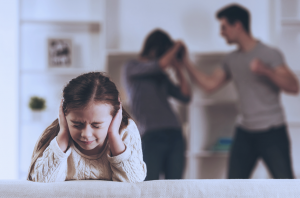
Living in a violent home with an alcoholic father, I quickly learned that it was not safe to be seen, and down-right dangerous to be extroverted, silly or playful.
Anything could set my dad off and his explosions were unpredictable and brutal. From beatings to verbal tirades, to manipulation, threats and gas-lighting, I went through it all.
Add to this the sexual abuse that I experienced and witnessed, and the result was a cumulative stripping away of my self-esteem.
There is no one event or pivotal moment that I can look back on and pinpoint as the exact cause of my plummeting self-confidence.
Instead, it was a never-ending barrage of abuse; sometimes subtle, sometimes direct – always damaging. Like a shoreline ravaged by ceaseless tides, my confidence and personality were eventually eroded to near-nothing.
I retreated inside my body in a form of internal dissociation. (We can either dissociate out of our body externally or we can dissociate internally – retreating and disappearing inwards)
What Was Your Experience Like?
Can you relate to this erosion of self? Take a moment to think about how you survived your trauma or abuse? What kind of experiences did you live through? Did you fight back? Did you flee? Did you freeze, fawn or dissociate? How did what you experienced shape you and your identity? What has your abuse cost you and how does it still limit your life today?
.
.
I Became Invisible to Survive
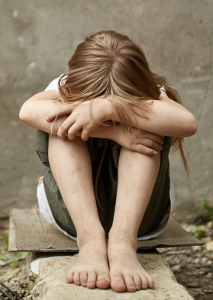
After the ballet lessons stopped and we relocated to the North of England, my world shrank and it became my sole intention to hide and stay safe. To be invisible. To pass through my days at school and at home unnoticed. I cut myself off from my body sensations, feelings and emotions, going through each day on auto-pilot.
I had no idea that the emotional, physical and sexual abuse were not my fault. In fact, I thought I had caused it all. I was told, explicitly by my father and shown implicitly through his mis-treatment of me, that I was bad and at fault and I blamed myself entirely.
The Forming of Trauma-Bonds
This self-blame is so prevalent among sexual abuse and trauma survivors. To turn the blame inwards is a hugely common, yet unconscious survival strategy.
When a child is being abused, they DO NOT stop loving their abuser. They stop loving themselves. This is a pattern that is simultaneously destructive to the child’s emotional well-being and yet essential for survival.
When a primary care-giver is also the main source of pain and suffering, a child’s brain has to work extra hard at survival. In order to keep receiving care from an abuser, children will often unconsciously convince themselves that the care-giver is NOT bad, but that it is they themselves who are at fault, bad, wrong, to blame.
This is a complex coping strategy, and one of the main ways child abuse survivors are able to continue to receive care in the face of maltreatment from an abusive caregiver. It is commonly known as the Fawn Response and is frequently seen in hostage situations where it is referred to as ‘Stockholm Syndrome’. This is where the hostage will form an attachment bond with their captor (or abuser) in an unconscious attempt to ensure their survival.
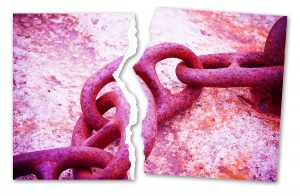 So How Did I Break Free From These Trauma-Bonds and Move From Merely Surviving to Thriving?
So How Did I Break Free From These Trauma-Bonds and Move From Merely Surviving to Thriving?
My path to healing has certainly been long and winding. In the beginning I tried so many different things in my attempt to feel better.
I tried yoga and meditation; dancing, and swimming. I tried positive affirmations and journaling. I tried kick-boxing and running. I tried body work and acupuncture. And I prayed. A lot. All of these things were helpful to varying degrees.
The biggest shifts that I have made through it all though have been by combining EFT Tapping with Somatic Experiencing. I have sought the guidance of coaches and made huge progress independently too.
Gradually, I have worked to re-wire my brain and my nervous system. I used Tapping to release old negative beliefs and patterns of behavior that were handed to me and which I took on as my own. Somatic Experiencing enabled me to sit with the flashbacks and body memories, processing and releasing them. Along the way, I have reclaimed pieces of myself. I dance weekly now and that nourishes my soul and grounds me into my physical body in a way that has been profoundly healing.
Little by little, I have found more safety in my body and more safety in my day-to day life too. I am a wife and a mother and a coach despite the trauma that I have experienced.
Do I still get triggered – yes. Is there still more to heal – of course. But I’m no longer the terrified shadow of myself that I was for so long.
For too many years, I put pressure on myself to heal. Pressure to heal more quickly and more completely. I fell into the ‘I’ll be happy when…’ trap, believing that only when I was ‘fully healed’ could I really live my life.
I mistakenly thought ‘I’ll be worthy of love when I’m healed. I can start a family when I’m healed. I’ll be happy when I’m healed. I’ll reach my goal weight when I’m healed. I’ll be a coach, capable of helping other people when I’m healed.’
Eventually though, I got tired of waiting for this mythical healing-completion-date to arrive and so I stopped waiting and started living. And living unapologetically. I finally realized that I am not broken. And I do not need fixing.
What happened to me was not my fault, just as what happened to you was not your fault. I cannot change what I experienced, but I now refuse to let it define me or limit me in all the ways it used to.
I have learned that healing does not happen in a neat and tidy, controllable vacuum. It happens along the way. Healing happens amidst the chaos and the messiness of life. Healing is part of my life, but it is not my whole life. When I am triggered I Tap, I journal, I process and I work to release my pain. But then I go on with living. And you can too.
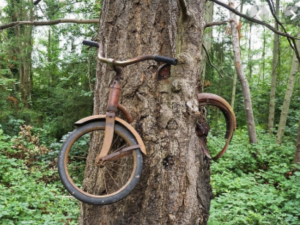
I came across a photo of a tree recently that really resonated with me. The image sums up what healing feels like for me.
Years ago, someone chained a bike to this tree. But the tree did not stop growing. Instead, it continued to grow. It grew around the bike. The bike, just like our trauma, is a part of us. We cannot change what happened to us but we don’t have stop living until we heal. We can reclaim our identity and self-esteem now and we can heal as we live and grow.
Whether you’re just beginning your healing journey or you’ve been on this path for years, please know that I’m here to guide and support you as you work to release your trauma and reclaim your identity and sense of self. I see you. You deserve to be heard and you deserve to heal.
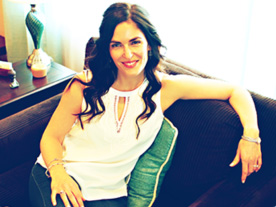
Dear Karen,
I reached you following the fabulous 3 Ortners after soooo many yesrs of ways to heal my traumas.
I See my self in your life story.
I have being feeling not good enough and fondina always partnership very much like my father in a way or other.
Always feeling that I deserve to be punished.
I’d love to get in touch with you as you managed to give me the hope to start to “live an healty and joyful life”.
It can feel that way so often after trauma. But you do not have to punish yourself anymore. You are worthy of happiness and of healing. Much love to you! ❤️
Thank you for sharing your story. It was my story, too, and I went inside, trying to be invisible and safe. I’m working hard to become more visible to myself and others. Please keep sharing! It’s very helpful. Sue
Thank you for sharing your story. It takes alot of courage to be able to share what you shared.
I am working for 10 years now to deal with a sexual assault from childhood. I do well and feel like I’m helaing and then I get triggered and fall into depression.Hills and valleys. I have several modalities I use to help heal and I’ve recently incorporated tapping.
The struggle is real and it seeps into so many of the other parts of my life. I feel like I need more help. I need more speciic tapping, or something.
Blessings to you.
Heather
I’m so glad you’ve found some modalities that are helping you Heather – including Tapping. 🤩 You’re so right – it’s definitely a journey of many miles with plenty of hills and valleys. Please keep on going. And do let me know if there are specific topics I can perhaps cover in a blog post – perhaps a specific tapping script or tap-along video on a given subject might be useful. Wishing you all the very best as you continue to heal. Karen 🥰
Thanks for this post. My abuse was more emotional than anything else. Nothing I ever did was ever good enough, I never felt good enough. I had 2 abusive exs that destroyed my self image. I recently discovered tapping from your family and I love it and I love all of you. Thank you.
Julia
No matter what form our abuse takes, it can have such a huge and often detrimental impact on our lives. I’m so sorry to hear a little about what you’ve experienced Julia. And I’m so glad you’ve found tapping so helpful. Keep going. ☺️